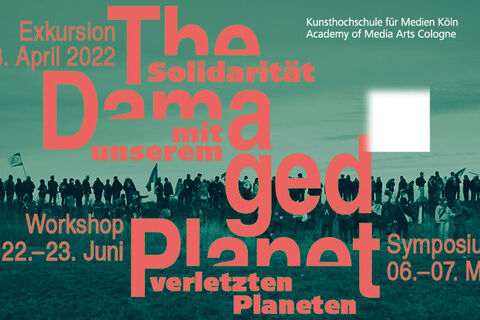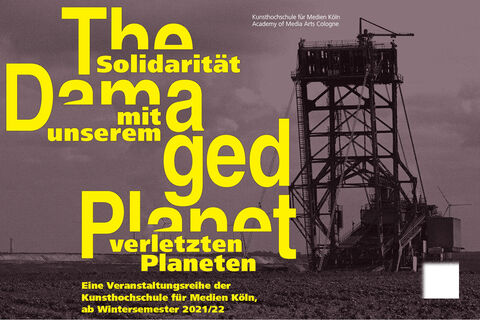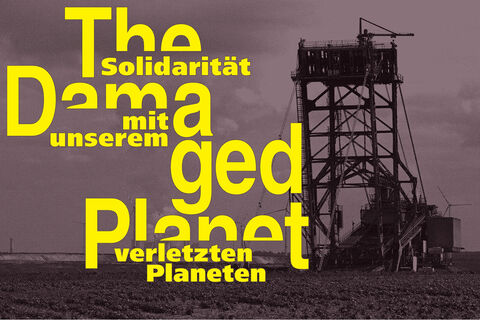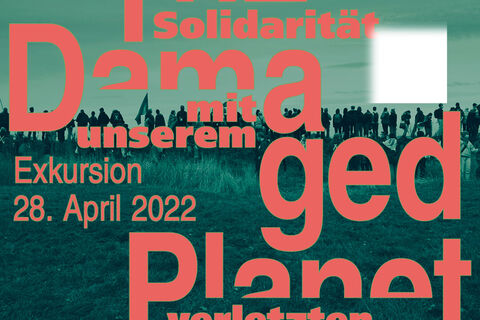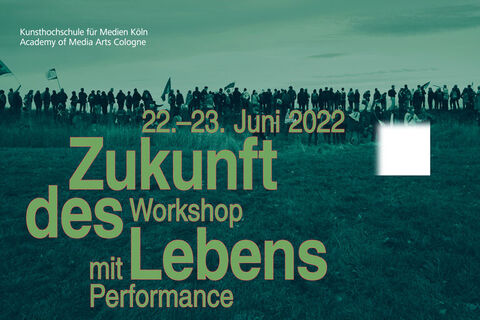The Damaged Planet – Solidarität mit unserem verletzten Planeten: Veranstaltungsreihe und Symposium im WS 2021/22 und SoSe 2022
The Damaged Planet – Solidarity with our wounded Planet: Excursion, Symposium, Workshop, Performance in the summer semester 2022
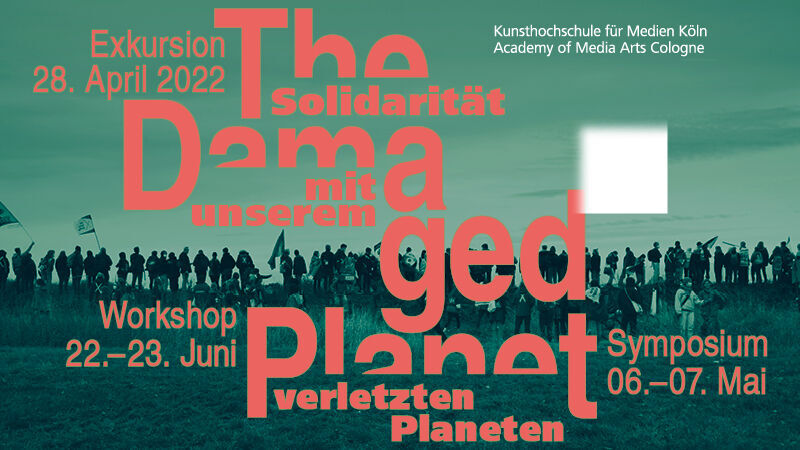
The series of events that started in the winter semester continues in the summer semester 2022: with the central symposium "The Damaged Planet" on May 6 and 7 with international guests, with an excursion with Michael Zobel – Forest instead of Coal: Forest Walk in and around the Hambach Forest (April 28) and in June with the two-day workshop "Future of Life" and the performance "Mutante: Requiem for a Forest" on the last evening.
Overview of all events
Forest walk in and around the Hambach Forest
Thursday, April 28, 2022, 1:30 pm,
Registration via: thedamagedplanet@khm.de
with international guests at the Aula of the KHM and online via YouTube
Friday and Saturday, May 6 and 7, 2022
Registration via: thedamagedplanet2022@khm.de
Opportunities for action in the climate crisis are being discussed worldwide: many political processes have been initiated, the EU is working on a Green Deal, and some countries have begun to convert to a CO2-neutral energy supply. Nevertheless, the limited time window available for a global ecological transformation is not being taken into account; the prevention of extinction of species as the second fundamental pillar for survival continues to be ignored. Questions of social justice arise: how can we ensure that the upcoming transformation does not disproportionately burden lower and middle incomes? What is a fair compensation for the damage already caused in the countries of the Global South? The willingness to radically rethink the economy and society is missing. At the same time, excessive political and private-sector green-washing is taking place wherever we look. At our conference, we want to meet these challenges with radical approaches and concrete action.
With contributions by: Leonie Bremer, Alenda Y. Chang, Peter Emorinken-Donatus, Thom van Dooren, Fabiana Fragale, Beate Gütschow, Carmen Hornbostel, Kilian Kuhlendahl, Jens Mühlhoff, Milo Rau, Doris Schweitzer, Nicole Seymour, Esteban Servat, Agnes Stillger, Louise Wagner, Markus Wissen.
PROGRAM
Friday, May 6, 2022
12:00 - 12:30, Introduction
12:30 - 13:45, Carmen Hornbostel / Milo Rau (NT Gent) – A Theater of Sustainability? Production, Distribution, Theory, Politics
14:00 - 15:00, Fabiana Fragale, Jens Mühlhoff and Kilian Kuhlendahl (Kunsthochschule für Medien Köln) – A struggle with bodies and images
BREAK
15:30 - 16:30, Leonie Bremer, Peter Emorinken-Donatus, Esteban Servat and Louise Wagner - Panel discussion with activists from Fridays for Future, Bündnis Ökozidgesetz, Shell Must Fall, Ende Gelände
16:45 - 18:00, Doris Schweitzer (Goethe-Universität Frankfurt) – "Rights of Nature" as a critical intervention?
BREAK with catering
18:30 - 19:45, Markus Wissen (Hochschule für Wirtschaft und Recht Berlin) – Imperial and solidary way of life
Saturday, May 7, 2022
10:30 - 11:45, Agnes Stillger (Universität zu Köln) – For the preservation of the balance of all living things. Ecology-critical art practices in Africa
12:00 - 13:15, Thom van Dooren (University of Sydney) – Stories from the Snail Ark: Hope in a Time of Loss
BREAK
14:30 - 15:45, Beate Gütschow (Kunsthochschule für Medien Köln) – Report from the research sabbatical
16:00 - 17:15, Alenda Y. Chang (University of California, Santa Barbara) – Cloudy with a Chance of Play
BREAK
17:30 - 18:45, Nicole Seymour (California State University, Fullerton) – Climate Change and the Limits of Satire
19:00, Closing discussion
Workshop "Future of Life"
with the dramaturge Dr. Frank M. Raddatz, the political scientist Christopher Coenen and Prof. Kathrin Röggla from the KHM
Wednesday and Thursday, June 22 and 23, 10:00-17:00, Aula of the KHM
Registration via:
Information here >>>
Mutante: Requiem for a Forest
Performance with artists and participants of the workshop
Thursday, June 23, 20:00, Aula of the KHM
Registration via:
Information here >>>
Organizers: Pascal Dreier, Beate Gütschow, Thomas Hawranke, Ute Hörner, Fatima Kastner, Isabell Lorey and Kathrin Röggla.
About the international guests of the symposium
In the order of their appearance
Carmen Hornbostel / Milo Rau
A Theatre of Sustainability? Production, distribution, theory, politics
At NTGent, the Ghent City Theatre, we work with the subject of sustainability on different levels. Structurally, within the framework of the Green Books and the European network Stages. How can theatre be produced, presented and distributed (e.g. toured) in a sustainable way? With A play for the living in a time of extinction and Grief & Beauty we tried (or try) to explore this in the context of actual productions - as detailed and consistent as possible. In other formats (such as the School of Resistance), we explore the same questions intellectually and activistically, from a global perspective. We will present these concrete strategies and structural results during the discussion.
Carmen Hornbostel studied psychology. She has been a dramaturg at IIPM since 2017 and at NTGent since 2018. She works with Milo Rau, Angélica Liddell, Luanda Casella and Thom Luz, among others, and is co-editor of the book Why Theatre?, which includes responses from 106 international artists. With Grief & Beauty (2021) she tested the Theatre Green Book and leads the EU project STAGES at NTGent, in which a sustainable production and touring practice is developed together with 9 partner theatres in Europe.
Milo Rau has been artistic director of the IIPM - International Institute of Political Murder since 2007 and of the Belgian theatre NTGent since 2017. Critics call him the "most influential" (DIE ZEIT) and "most ambitious" (The Guardian) artist of our time. Since 2002, he has published over 50 plays, films, books and actions, which have been shown at all major international festivals. His projects that have explored sustainable "micro-ecologies" in recent years include Orestes in Mosul / A Filmschool for Mosul (2018-2022) and The New Gospel (2019-2022).
Fabiana Fragale, Kilian Kuhlendahl, Jens Mühlhoff
A Struggle with Bodies and Images
In 2018, the failure of climate policy in the Hambach Forest clashed with activists who entrenched themselves in tree houses. Steffen Meyn filmed in this forest because he wanted to preserve what would once have been there. Through his artistic practice, Steffen has also become an activist. His camera became a powerful instrument in the midst of the clearing of the forest: it made the protest from the sealed-off forest visible in the first place and at the same time had a de-escalating effect. During his filming, our friend Steffen had a fatal accident. He left his sensitive film material behind. Now we are working on a documentary film that walks the tightrope between political interests and personal responsibility.
Fabiana Fragale was born in Zurich in 1994. Since 2015 she has been studying at the Academy of Media Arts Cologne. Her work in film deals with anti-capitalist and intersectional-feminist topics. In 2018, she founded the artist collective Polsprung.
Jens Mühlhoff, born 1991 in Wuppertal, studied at the Academy of Media Arts Cologne. His works investigate the everyday making of politics in public space. He works on various film productions and as a coordinator for independent art productions.
Kilian Kuhlendahl, born in 1993, studied at the Academy of Media Arts Cologne. Since then, he has been working as a freelance author in various narrative forms and organises literary evenings. He has also been a member of the Polsprung collective since 2018.
Leonie Bremer, Peter Emorinken-Donatus, Esteban Servat and Louise Wagner
Panel discussion with activists from Fridays for Future, Bündnis Ökozidgesetz, Shell Must Fall, Ende Gelände
The activists Leonie Bremer, Peter Emorenken-Donatus, Esteban Servat and Louise Wagner report on their latest actions as part of Fridays for Future, Bündnis Ökozidgesetz, Shell Must Fall and Ende Gelände.
Leonie Bremer: I am mainly a climate activist with Fridays for Future Germany and International, and I am also studying full-time for a Master's degree in Renewable Energy at the TH Cologne. My work at Fridays for Future focuses on working with MAPA (Most Affected People and Areas).
Activities for Fridays for Future Germany: organization of the first Germany-wide permanent strike week / political strategy of nationwide actions / press relations and press training / campaign management nationwide (2018 - present).
Activities for Fridays for Future International: connecting Global North with MAPA / organizing the #CleanUpStandardCharteredCampaign / press relations / finance / managing the content of the international Fridays for Future website.
Peter Emorinken-Donatus: 55 years old, born in Nigeria, living in Germany for over 30 years, freelance journalist, educational consultant, activist (human rights, climate / environmental justice, colonial heritage and restitution, among others), long-time opponent of the Shell corporation, co-initiator and ex-chairman of the movement Pay Day Africa, member of the network African / Black Community (ABC) as well as the Committee for an African Monument in Berlin (KADiB). KADiB has been campaigning for decades for the establishment of a central monument as a place of remembrance and learning about colonialism and neo-colonialism. In addition, he is also co-founder and spokesman of the movement Bündnis Ökozidgesetz (Ecocide Law Alliance), which was founded with the aim of criminalizing ecocide (the most serious environmental crimes). Other main topics: "The Third World in the Second World War" and "Decolonization".
Esteban G. Servat: I have fully dedicated the latest years of my life to translating research into action to fight corporate power, building grassroots resistance against climate criminals both in the Global South and North.
Movement building: Built an anti-fracking movement with tens of thousands of people in Argentina after leaking a secret government report revealing contamination. Exposed government & corporate corruption, threatening billion-euro fossil fuel interests on world´s second-largest shale gas basin. Became target of intense persecution and threats, leading to exile.
Drive to tackle corporations: Researching & making presentations exposing the central role of corporations in the climate crisis, for European climate movements to focus attention and resources toward tackling multinationals.
Anti-corporate internationalism: organized campaigns and protests against multinational climate criminals & built Global South-North grassroots coalition with 20+ countries, connecting the dots of gas extraction & consumption.
Louise Wagner: Institutionally, I studied ethnology and sociology, with a focus on the emergence of socio-ecological inequalities from a perspective critical of capitalism. I wrote my thesis and held several lectures about geoengineering and the question if there can be such a thing as geoengineering from the left. Currently I am listening to and participating in several group processes within the climate justice movement on a national and international level. I hope to contribute to turning things and discourses from head to toe, and to build relations, between people, movements and knowledges, that strengthen and grow the movements and their people. Herein, learning and unlearning are two equally important elements of the process.
Doris Schweitzer
"Rights of Nature" as a critical intervention?
In the debates and political struggles around the "rights of nature", three central arguments can be identified on the side of the proponents: the empowerment of local communities, the decentralisation of the Human in law, and the establishment of an anti-capitalist counter-law. With a focus on the philosophical work of Michel Serres on The Natural Contract, these three arguments will be critically questioned. In doing so, we will explore how to approach an understanding of the "rights of nature" as a critical intervention.
Doris Schweitzer studied sociology and law, completed her doctorate with the thesis Topologies of Critique. Critical Conceptions of Space in Gilles Deleuze and Michel Serres, and habilitated with the thesis Juridische Soziologien. Law and Society from 1814 to the 1920s'. Since October 2021, Doris Schweitzer has held the professorship of sociology with a focus on sociological theory and the history of theory at the Goethe University Frankfurt am Main. Her main areas of work include social and social theory, epistemology and genealogy of sociological analyses of society, as well as (new and older) materialisms and sociology of law. She is currently engaged in research on questions of the legal reorganisation of things and the law of the Anthropocene
Markus Wissen
Imperial and solidary way of life
The basic idea behind the concept of the imperial way of life is that unsustainable patterns of production and consumption are also stable because they succeed in externalising their socio-ecological costs in time and space. However, the escalation of the ecological crisis shows that this possibility is less and less feasible. Conflicts over resources are increasing, catastrophic events are becoming more frequent, including in the global North. There are attempts to deal with the crisis of the imperial way of life with strategies of ecological modernisation. Authoritarian approaches that try to secure an outdated model of prosperity exclusively for a small number of people are also gaining strength. However, alongside and against this, there are initiatives that fight for different social relations with nature and for the dismantling of social domination, in short: for a way of life based on solidarity. The lecture sheds light on these contradictory developments and discusses the chances of emancipative approaches in the current crisis.
Markus Wissen, Dr. phil., is Professor of Social Sciences at the Berlin School of Economics and Law and Fellow at the Institute for Social Analysis of the Rosa Luxemburg Foundation. He teaches and researches on social relations of nature, imperial lifestyles and socio-ecological transformation. At the Rosa Luxemburg Foundation, he is involved as spokesperson for the research training group Crisis and Socio-Ecological Transformation and as a member of the scientific advisory board and the discussion group Future: Cars, Environment, Mobility. He is also editor of PROKLA. Journal for Critical Social Science. In 2017, together with Ulrich Brand, he published the book Imperiale Lebensweise. Zur Ausbeutung von Mensch und Natur im globalen Kapitalismus (On the Exploitation of People and Nature in Global Capitalism), published by Oekom-Verlag in Munich.
Agnes Stillger
For the preservation of the balance of all living things. Eco-Critical Art Practices in Africa
The combination of science, power and machinery of European colonialism aimed to discover and appropriate "cheap" natures (J. W. Moore) worldwide, accompanied by new forms of mapping and quantifying the world. The violent subjugation of the earth in the racial capitalocene in favour of the Global North (F. Vergès) emerges from a Western thinking marked by dichotomies, for which everything other-than-human is objectifiable. Frantz Fanon already called for a decolonial concept of nature in The Wretched of the Earth. Art practices in Africa provide important impulses for an eco-critical rethinking, for instance through the rediscovery of cosmologies, traditions and languages that consider all living beings and the material world as part of a system of life-sustaining relationships.
Agnes Stillger studied art history in Munich with a focus on contemporary African art. Since 2021, she has been a doctoral candidate at the research training group "anschließen - ausschließen" - Cultural Practices beyond Global Networking at the University of Cologne. She has been involved in various curatorial projects on transcontinental exchange processes, including Flow of Forms / Forms of Flow. Design Histories between Africa and Europe and Seeds For Future Memories. Voicing the two ends of migration. In Florence in 2019, she organised the symposium Transverse Trajectories. Speculative routes out of ruinous landscapes. Together with artists from Dakar and Berlin, she is currently developing the project Dry Ocean, which deals with pluriversal knowledge.
Thom van Dooren
Stories from the Snail Ark: Hope in a Time of Loss
The Hawaiian Islands were once home to one of the most diverse collections of land snails in the world, including over 750 distinct species. The majority of these species have now been lost, and most of those that remain are also facing extinction. This lecture will explore the efforts of conservationists to hold onto these disappearing species by bringing them into a highly controlled, captive, environment. As we move ever more deeply into the planet’s sixth mass extinction event, these kinds of banking efforts are becoming increasingly common for a wide range of animals and plants. In this context, this lecture will explore the practices of care that animate these places and aim to hold species at the edge of extinction a little longer, asking: what new forms of hope and mourning are required to responsibly inhabit this time of loss?
Thom van Dooren is Deputy Director at the Sydney Environment Institute and an Associate Professor in the School of Philosophical and Historical Inquiry at the University of Sydney, and a Professor II in the Oslo School of Environmental Humanities, University of Oslo. His research and writing focus on some of the many philosophical, ethical, cultural, and political issues that arise in the context of species extinctions and human entanglements with threatened species and places. He is the author of Flight Ways: Life and Loss at the Edge of Extinction (Columbia UP 2014), The Wake of Crows: Living and Dying in Shared Worlds (Columbia UP 2019), and the forthcoming A World in a Shell: Snail Stories for a Time of Extinctions (MIT 2022). www.thomvandooren.org
Beate Gütschow
The artist Beate Gütschow, who is a professor at the Academy of Media Arts, will report from her research sabbatical. Beate Gütschow deals with a wide variety of aspects of the climate crisis: she documents damage, photographs greenwashing, industrial polluters, and climate protests. Using this material, Beate Gütschow assembles photographic montages and collages, she develops text-image combinations and documentary image series. Existing images of the climate crisis are modified and commented on in order to give them a new visibility.
Alenda Y. Chang
Cloudy with a Chance of Play
The future of games is uncertain. Playing in the twenty-first century will be contingent on many matters outside of our control, from outside temperatures to the supply chains for electronic devices and components. Yet conventional wisdom about games runs something like this: games grant players limited agency over a bounded situation; play is consequence-free, almost prophylactic, a way to experiment with identities and scenarios without fear of repercussion. How, then, might thinking the climate-disrupted future through games remind us of the vulnerability and risk that is also at the heart of the play experience? And as youth-led environmental movements draw attention to the inertia of adults and their governing bodies, often by pointing to the untimely end of their childhoods, how do we make the case that games are still a relevant discourse for the Anthropocene, and not just its impending relics?
Alenda Y. Chang is an Associate Professor of Film and Media Studies at the University of California, Santa Barbara. Chang’s work has appeared in numerous journals, among them Interdisciplinary Studies in Literature and Environment, Qui Parle, electronic book review, Feminist Media Histories, and Resilience. Her 2019 book, Playing Nature: Ecology in Video Games (University of Minnesota Press), develops environmentally informed frameworks for understanding and designing digital games. At UCSB, Chang co-directs Wireframe, a studio promoting collaborative theoretical and creative media practice with investments in global social and environmental justice. She is also a founding co-editor of the UC Press open-access journal, Media+Environment.
Nicole Seymour
Climate Change and the Limits of Satire
In this talk, Nicole Seymour will build on her past scholarship on humor and North American environmentalism to consider what many commentators have identified as a current crisis in comedy. As critic Alison Herman argues, U.S. satire is at an impasse because it is “hard … to come up with something … funnier or stranger or more shocking than what’s already unfolding on our [news] feeds.” But as Seymour and her colleague Anthony Lioi have recently found, concerns over this “struggle to heighten the heightened” might be overstated or, at least, misplaced. As a case study, Seymour considers African American comedian Sarah Cooper, who went viral with TikTok videos in which she lipsynched to Donald Trump’s speeches on climate change and other topics. Seymour finds that Cooper’s lipsynching constitutes an innovative satirical technique: rather than exaggerating a political reality, she re-embodies and thereby estranges viewers from it—as a matter of relief as much as critique. Seymour also locates in Cooper’s work an homage to the history of African American satire, which has functioned to “demonstrate one’s cleverness, feeling, and, ultimately, one’s own humanity in the face of its constant denial” (Danielle Fuentes Morgan). Seymour concludes that satire still has an important, though circumscribed, role to play in an era of climate crisis.
Nicole Seymour is an environmental humanities scholar focused on contemporary North American literature, film, and culture. Her research maps out alternative traditions of environmental activism and affect. Her most recent monograph, Bad Environmentalism: Irony and Irreverence in the Ecological Age (University of Minnesota Press, 2018), shows how culturemakers deploy modes such as drag and camp to address environmental problems, in the process sidestepping “doomsday fatigue” and other stagnating emotions. In May 2022, Bloomsbury’s Object Lessons series will publish her environmental-cultural history of glitter. Dr. Seymour has held fellowships at the Institute for Advanced Studies in the Humanities at the University of Edinburgh and the Rachel Carson Center for Environment and Society in Munich. She is currently Associate Professor of English at California State University, Fullerton.



